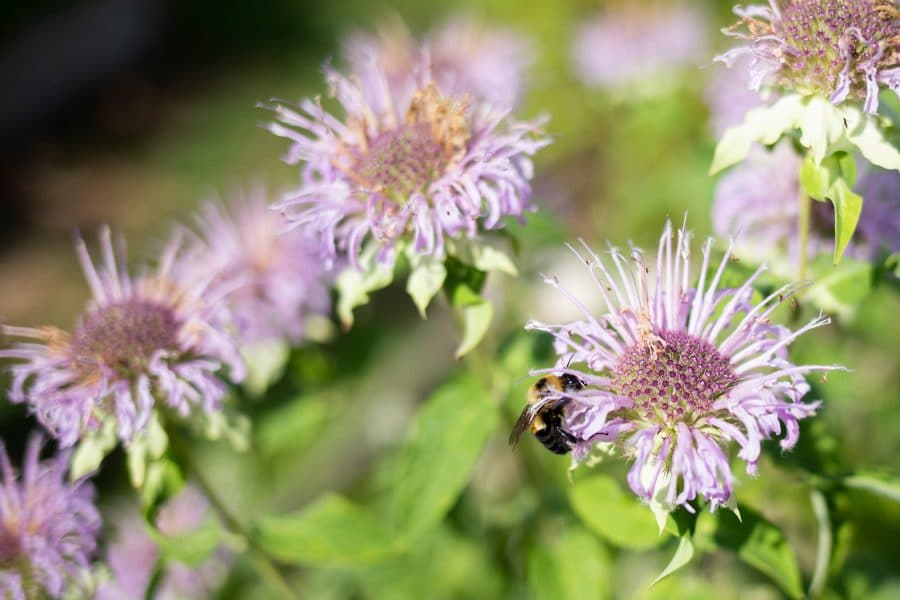The Citizen Potawatomi Nation began its partnership with the Tribal Alliance for Pollinators in 2016, vowing to assist in the revival of beneficial insects and animals by planting milkweed and other vegetation. Three years later, CPN continues those efforts by planting milkweed and other flora pollinators enjoy across the Tribe’s jurisdiction. Additionally, the Tribe employs land management techniques that create and sustain their habitats.
Pollinators include approximately 1,500 species of vertebrates including birds and mammals such as bats. However, the most common are insects such as bees and butterflies like monarchs.

When monarchs are caterpillars, they depend upon milkweed to provide sufficient nourishment required to metamorphose into a butterfly. CPN staff and Tribal members across the Nation’s jurisdiction foster the growth and habitat renewal for key insects like the monarch, which has experienced a population decline. In some states like California, monarch populations have fallen by up to 86 percent in one year.
North of the CPN Eagle Aviary, fields of native plants provide refuge and food for insects and other animals. Staff members Bree Dunham and Jennifer Randell cover milkweed within the field to collect seeds every summer. Their work helps expand the number of plants across Tribal land. They also send some of their annual harvest to TAP for use by other Native Nations.
Importance
“In a very basic term, pollinators are any living being that takes pollination off of plants and spreads them to other plants so that they can produce fruit and multiply,” said CPN Cultural Heritage Center Intern Gabriella Gombas.
As a sophomore at the University of Kansas and Haskell Indian Nations University, Gombas majors in psychology and American Indian Studies. She accepted an eight-week internship with the Tribe this summer to learn more about the connection traditional culture and food can have with mental health and overall wellness. One key takeaway she learned during her internship is without pollinators, most food the public consumes would not grow.
“Seventy-five percent of plants depend on pollinators for reproduction, and 30 percent of our food crops are dependent on pollinators,” said CPN Community Garden Assistant Kaya DeerInWater.
Sadly, recent trends indicate a sharp decline in all insect populations. Protecting habitats and providing sustenance for living creatures that facilitate pollination is key to food security.
“We’re in a huge, huge, huge decline in pollinators and insects in general,” DeerInWater said. “We’ve seen a decline of up to 75 percent in their populations. We’re basically in a tailspin right now, and we’re headed for a very dark place without all those pollinators.”
Because of the decline, farmers in places like China have employed humans to hand pollinate each plant.
“Unless you want your first job to be pollinating the fields with a tiny paintbrush, we should make sure that our habits and our trends in gardening and farming practices are supporting their habitats and livelihoods,” DeerInWater said.
“Animals provide so much for us, free of charge.”
Gtegemen
At Bodewadmi Widoktadwen Gtegan (Potawatomi Community Garden), staff and volunteers have sown seeds and developed practices that encourage habitat renewal including strategic mowing, no spraying of pesticides and other chemicals, and planting a variety of crops that help meet the needs of all pollinators.
Staff and volunteers also ensure the garden’s plants bloom throughout the seasons, not just during the spring.
“Right before fall, it gets cold, and it’s the most critical time for pollinators because they’re putting on fat stores to make it over the winter and hibernation,” DeerInWater said. “Having late blooming golden rods or iron weed, something like that out there, provides them their last grocery store run before winter.”
Ways to help
Having a variety of vegetation anchors the soil and protects topsoil from erosion. When lawns and fields feature one type of flora, soil moisture retention decreases. Regular mowing prevents key plants like milkweed from maturing enough to seed and reproduce.
“Plants in the prairie or a pasture are what anchor the soil, and if you have only Bermuda grass, you’re only getting 6 inches of roots; and over a generation or two, you’re going to lose your topsoil,” DeerInWater explained.
He encourages mowing in intervals to allow the full plant cycle to complete. He also advises supporting companies that employ sound agricultural practices. When grocery shopping, look for products with the Xerces Society’s Bee Better Certified seal. Getting out in nature also helps individuals become more conscious of the intricacies of life and helps build a respect for nature.
“Being aware centers yourself,” Gombas said. “People today can be in their heads — like the world revolves around them. If you just go out there and sit, you realize there is all this other stuff going on. It’s a humbling experience.”
Gombas highlighted humility as one of the Potawatomi seven Grandfathers Teachings.
“Thinking about those generations and generations of pollinators that provided food for us — that have supported us without asking for anything — giving back to them even in a little way like a 10-feet-by-10-feet flower bed or even just a potted plant,” DeerInWater said.
Attending CPN’s Garden Work Parties is a great opportunity to learn more about ways the public can support pollinators. For those living outside of central Oklahoma, DeerInWater encourages conducting research to find local community gardens.
If interested in seeds to start a garden and support pollinators, Monarch Watch, the Xercy Society, local agricultural extension agents and Bodewadmi Widoktadwen Gtegan staff can serve as resources.
“These plants that you can plant for pollinators are also culturally relevant to us. They are culturally significant plants, so you’re impacting your own livelihood, your own heritage, and your own life by planting pollinator-friendly plants,” DeerInWater said. “And you’re also impacting pollinator populations.”
For more information, contact kdeerinwater@potawatomi.org.
